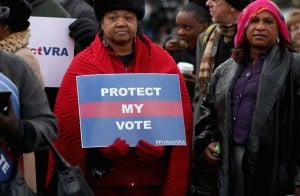
Attorneys from the Southern Coalition for Social Justice, the ACLU Voting Rights Project, and the ACLU of North Carolina appeared in federal court this week to argue for a preliminary injunction that would prevent North Carolina from enforcing its voter suppression bill, H.B. 589, during the November 2014 election. The hearing included testimony from North Carolina voters who will be affected by H.B. 589 as both voters and leaders of non-partisan organizations that educate and register voters. Although the Judge has not announced when he will rule on the SCSJ and ACLU’s request for a preliminary injunction, attorneys were encouraged by the judge’s attention to the case and look forward to the ruling.
“This week the court and the public heard from some of the people and grassroots organizations most affected by H.B. 589,” said Allison Riggs, a staff attorney for SCSJ. “Our witnesses demonstrated that African-American voters and citizens in North Carolina will be disproportionately hurt by H.B. 589’s repressive measures, and that the bill makes it more difficult for all people to participate in the political process. H.B. 589 is a violation of the 14th Amendment and the Voting Rights Act.”
Witnesses at the hearing included Melvin Montford, Executive Director of the North Carolina A. Philip Randolph Institute, Senator Dan Blue, Representative Rick Glazier, former Director of the Guilford County Board of Elections George Gilbert, and former Executive Director of the North Carolina State Board of Elections Director Gary Bartlett. The witnesses spoke about measures enacted since 1999 that expanded opportunities for voters to cast their ballots, how those measures have increased the rate at which African-American citizens are registered to vote, and how H.B. 589, enacted through a remarkably bad legislative process, would reverse those gains.
According to Dr. Morgan Kousser, an expert retained by SCSJ, North Carolina has gone from being 48th in the country in voting turnout in 1988 to 11th in the country in 2012, when nearly 65% of the statewide voting-eligible population voted. That dramatic expansion in citizens’ participation in democracy happened after changes to voting laws including the availability of early voting (also called no-excuse in-person absentee voting), same day registration, and the ability to count parts of ballots cast out of a voters’ regular precinct. Speaking to how that change happened, Melvin Montford of the A. Philip Randolph Institute described his dedication to educating voters about the process and getting them to the polls. The flexibility of early voting and same day registration helps grassroots organizations tremendously, and the loss or reduction of those provisions will be a serious obstacle to non-partisan voter education and get out the vote efforts. Representative Rick Glazier said that H.B. 589 was “an ambush on the people of North Carolina.”
In addition to the testimony of individuals who see H.B. 589 in terms of its effect on individual voters, SCSJ and the ACLU presented evidence quantifying the benefits of the procedures that H.B. 589 eliminates or reduces. In the 2010 midterm general election, for instance, over 27,000 voters registered through the same day registration (SDR) procedure that allows voters to register and vote at the same time, and over 200,000 voters cast their ballots on early voting days that are not available under the newly shortened time for early voting.
In addition to the North Carolina A. Philip Randolph Institute, SCSJ and the ACLU represent the League of Women Voters of North Carolina, North Carolina Common Cause, Unifour Onestop Collaborative, and individual voters. Joining SCSJ and the ACLU were the North Carolina State Conference of the NAACP and the United States Department of Justice, both of which have brought separate challenges to H.B. 589.
